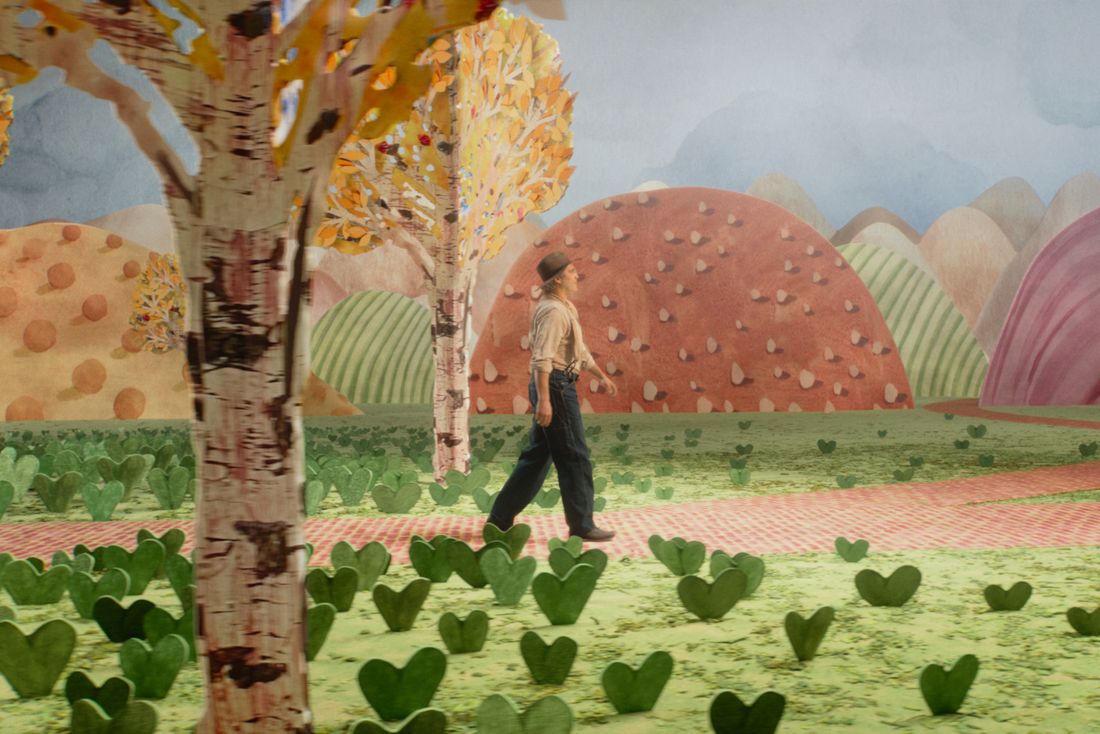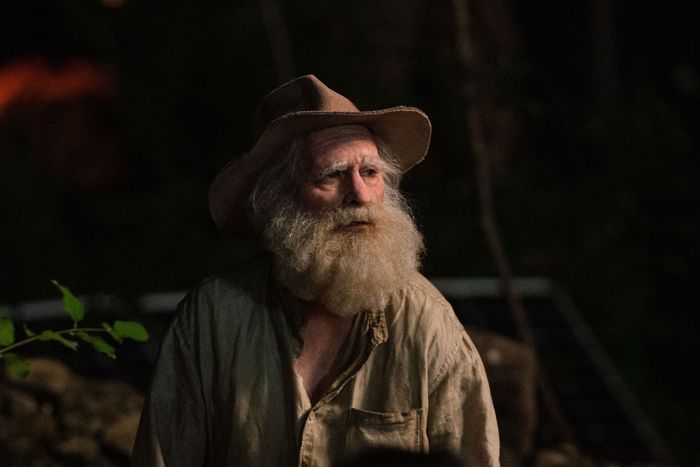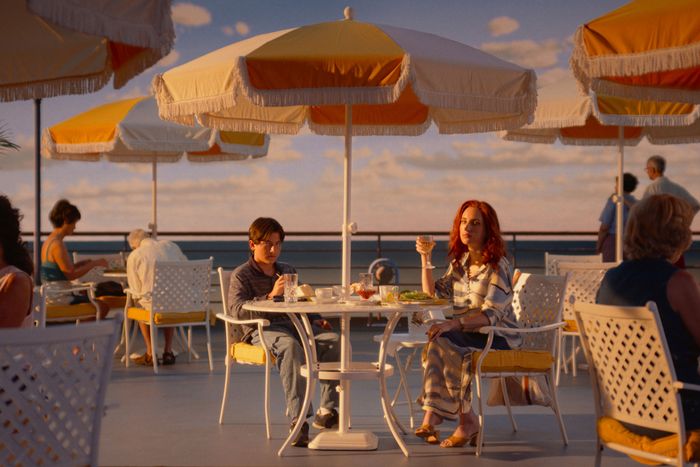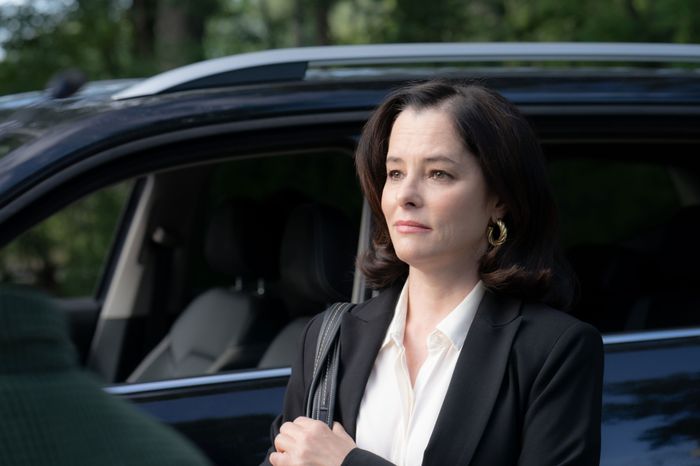
This piece was originally published in April. We are recirculating it now that Beau Is Afraid is available on digital. Spoilers ahead for the plot and ending of Beau Is Afraid.
Regardless of whether you think it’s a masterpiece or a career-ending crime against cinema, Beau Is Afraid will leave you with a lot of questions. Namely: Is writer-director Ari Aster okay? And what’s going on in the film’s crazy ending? The picture is structured as an existential mystery, always on the verge of delivering some big revelation that will clarify the insanity we’ve been watching. But Aster refuses to directly explain the events in the film. Even the finale, which has Joaquin Phoenix’s Beau Wassermann facing a surreal tribunal, doesn’t really tell us what’s been going on.
To try and understand what actually happens at the end of Beau Is Afraid, one must first look back at the rest of the movie. Aster’s three-hour magnum opus, a psychiatric session masquerading as a quirky A24 comedy-drama, follows Beau, a middle-age nobody living in a bleak one-bedroom apartment on a city street comically ravaged by crime. Beau is supposed to fly to see his mom on the anniversary of his father’s death, but his keys get stolen and he can’t leave. When his mom (Patti LuPone) finds out he’s not coming, she responds in a cold, passive-aggressive manner that hints at their dysfunctional relationship. Then, after a hilariously surreal sequence in which Beau desperately attempts to purchase a bottle of water from across the street (to take with his new anti-anxiety meds), our hero learns that his mother has died in a freak accident after a chandelier fell on her head. How does he find out? A random UPS driver (Bill Hader) who happened to find his mother’s headless body answers her phone when Beau calls.
It would be tempting to say that Beau Is Afraid is the story of Beau’s journey back home, but really, there isn’t much of a journey. After a hellish series of mishaps — involving a brown recluse spider, a naked tussle in an overflowing bathtub, a standoff with the world’s most inept cop, a stabbing, and a speeding truck ramming him from out of nowhere — Beau winds up in the pleasantly appointed home of Grace (Amy Ryan) and Roger (Nathan Lane), a relentlessly positive bourgeois couple who care for his wounds and promise to take him to his mom’s funeral. Constantly foiled in his attempts to leave, and already chewed out over the phone by his mom’s accusatory lawyer (Richard Kind), Beau is terrorized by Grace and Roger’s pissy teenage daughter, Toni (Kylie Rogers), whose pill-popping makes her own overmedicated parents look like Temperance League activists.
Finally, he manages to escape, chased by Grace and Roger’s animalistic psycho boarder Jeeves, who served with their now-deceased son Nate on the front lines in Caracas (where the U.S. has apparently been fighting a war with Venezuela). Beau runs into the forest and winds up in a back-to-nature theater troupe–commune called “The Orphans of the Forest.” They stage a highly symbolic play that seems, weirdly, to coincide with Beau’s own life, even though it doesn’t actually coincide much with his life at all. The play itself is about a guy who watches a play that seems to coincide with his life, the point perhaps being that sometimes art that has nothing to do with our lives can feel like it’s all about us. And Beau’s experience of watching the play begins to lay the groundwork for the final act of the film.
I. Beau’s Father, the Giant Penis Monster
Beau’s mother previously told him that his father died when he was conceived — that his dad was, in fact, killed at the moment of sexual release, the victim of a hereditary disorder that also claimed his grandfather and great-grandfather. There’s a man (Julian Richings) in the Orphans of the Forest campground who claims that he knew Beau’s father; he whispers that he helped take care of his father and that he is still alive. Beau begins to wonder if this man might actually be his father. Then the father guy explodes as the camp is attacked by a heavily armed Jeeves, who blows everyone away, including, somehow, himself. Beau runs into the forest, but the ankle monitor Roger put on him switches to “incapacitate” and zaps him unconscious.
Whenever Beau goes unconscious in the film (which is often), Aster tends to cut to two things. One is a flashback to a cruise Beau took as a teen with his mom, where he met Elaine, a vivacious girl with whom he fell in love, and who was taken away from the trip by her mom. Another is a hazy dream from Beau’s childhood in which he is in a bathtub, being washed by his mother. In the dream, young Beau asks about his father. “You know where Daddy is. Daddy’s dead!” Mona, his mother, tells him. She leads Beau, clothed, away and turns to the camera and angrily asks, “You want Daddy, too?” This is when we realize that the camera’s point of view is that of another person in the room. Mona then leads the boy to the attic, makes him go up the stairs, and then slams the attic door, yelling, “We don’t talk about you anymore!”
Let’s flash forward a bit, because this event is worth exploring. We learn more about this dream later in the film, when Mona (having revealed she is still alive — long story; we’ll talk about that in a bit) plays a recording of adult Beau telling his therapist about the dream. “There’s another me, but he’s braver,” Beau tells the shrink, suggesting that the weak Beau is in the bathtub, while the stronger, braver Beau is being punished. After the recording ends, Beau tells Mona he wants to know the truth about his father. Mona replies that she tried to keep that truth from him, for his protection. She leads him to the attic stairs and then yells, ominously, “That wasn’t a dream. That was a memory!” Which sounds significant, but in a movie that runs almost entirely on dream logic, is there really any difference?
Upstairs, in the darkened attic, Beau looks around with a flashlight. He sees a gaunt, debilitated, gray-haired, and bearded figure leaning against a wall. (This man is wearing the same T-shirt that “brave Beau” was wearing in those flashbacks. He also looks like Joaquin Phoenix, though the film credits an actor named Julien Fortin as “Beau’s Twin in Attic.”) Then Beau points the flashlight to another corner of the room, and he sees … an enormous penis monster — a giant, screaming dong-beast with huge balls and spiky, arthropod arms. “My boy …” the penis monster rasps. Just then, into the attic bursts Jeeves, who is, somehow, still alive. He fires at the penis monster and starts furiously stabbing it, only for the penis monster to drive one of its sharp arms through his head, instantly killing him. Beau falls out of the attic and his shrink drags him away, while Mona wails, “That was your father!”
So, was that Beau’s father? Was Mona impregnated by an enormous sentient phallus? Like most of the film, it probably makes more sense to read this symbolically. We could, of course, spend a lot of time grafting a Freudian interpretation onto the events of Beau Is Afraid. (There’s certainly a lot of Oedipal stuff going on.) But there may be a simpler way of looking at this. Beau’s father has been absent all his life. Is the father absent because he’s dead, or useless, or because Mona has symbolically cast him to the attic of memories we do not speak of? You can take your pick — it not only doesn’t matter, it could also be all three options. All Beau knows of his dad is that he allowed Mona to conceive him, a notion that has grown bigger and bigger in his mind all these years. Dad might as well just be a huge dick, in all senses of the word.
But who is the other man in the attic? Is that … also Beau? The braver version of himself he talked about to his shrink? Or is it maybe a long-lost brother — maybe even a twin — who has been living in the attic, forgotten, ever since he asked about Dad? He holds out an empty cup or bowl, as if he’s been starving forever. This figure has had no love. He’s only had giant-penis dad, who can conceive but can’t nourish. Later, Beau will be referred to as Mona’s “sole surviving son.” Does the other son exist? Did the other son exist? Either way, this gaunt, sad figure is perhaps a cautionary tale of what happens to boys who dare to flee their mother’s influence or who simply dare to be different. He might be the most haunting image in the film.
II. Beau’s Mother, an Interventionist and Cruel God
In the final act, Beau hitches a ride to Wasserton, the pleasant waterside village where mom’s home is. Wasser is German for water, and images of it show up repeatedly in the movie. We often hear water on the soundtrack and occasionally even see flashes of a darkened lake or ocean. We’ve returned repeatedly to the dream-memory of Beau in the bath and to the ocean cruise where Beau met Elaine. In an early scene set in Beau’s city, we see a mom berate her child for not listening to her; the child is playing with a boat in a small pool of water. Beau’s anti-anxiety medication has to be taken with water, hence why he attempts to purchase a bottle of it after the water in his building is shut off. Water can be freedom, but it can also mean death: On the cruise, Elaine excitedly took Beau to see a dead man floating in the pool. Water can be symbolic of a mother’s love, which can be smothering and destructive, as we’ve seen. It can also be denied, as retribution. Think of the man in the attic and his empty bowl.
Back to Wasserton. Beau is late, and his mother’s funeral is over. He walks inside and sees the open casket where Mona’s headless body lies. A recording plays of her lawyer’s funeral speech about her lifelong dedication to her son, with characteristic digs at his failure to show up to the funeral on time. Beau looks around at the photos on the walls. Many are from his youth, but there’s also one that looks like a surveillance image from earlier in the film, at Grace and Roger’s house, hinting that Beau’s mom has been in control of his life all along.
A further look around Mona’s house adds proof. Framed photos and posters show how her company has grown over the years. (The company is identified by an “MW” logo we’ve seen throughout, including in Beau’s building and as one of the production companies of the very film we’re watching.) We discover that MW is, among other things, some sort of pharmaceutical giant, peddling meds all across the country and presumably to many of the characters Beau has met, and to Beau himself: ADHD meds, allergy meds, instant dinners, safety razors, pimple creams, and, eventually, “rehab neighborhoods” and housing complexes such as the one Beau lives in. MW’s motto seems to be “Perfectly Safe.” And a lot of the ads we see feature the young Beau, a literal poster child for these ailments and conditions. Has Mona been using Beau as some kind of guinea pig? Or is it that Mona, so pathologically obsessed with Beau’s safety, has built an entire, childproof world around him? There are two seemingly conflicting takeaways: the sheer breadth of Mona’s concern for her son’s well-being, and the cynicism with which she has used Beau to build this empire.
It’s terrifying, but also kind of touching — an expression of how protectiveness can curdle into cruelty. This is one of the ideas at the heart of Beau Is Afraid, and one of the animating forces behind just about every scene. Beau has lived in fear all his life. He’s quite relatable in this regard. The images Aster chooses to depict the dangers of the world feel like ones that could have been ripped from the internet. (How many of us have spent an hour or two reading about the dangers of brown recluse spiders on dodgy websites well into the night?) Armed psychos, serial killers, zonked-out junkies, deadly spiders, moody teens — the demons of Beau Is Afraid are a litany of modern American bogeymen. But attempts to protect ourselves from these fears wind up being counterproductive and deadly in their own regard. Grace and Roger closed off their son’s room after he died. So what did their daughter wind up doing? She went in there and killed herself, another forgotten child who chose to break free of her parents, albeit in the most horrifying way.
While its portrait of a nation neck-deep in fear, medication, and runaway overprotectiveness strikes home, Beau Is Afraid isn’t building up to some screed against the pharmaceutical industry or cynical internet headlines; its targets are more cosmic and existential. Looking at photos of Mona’s employees, Beau is shocked to see Elaine (played as an adult by Parker Posey). She has apparently been working for Beau’s mom for years. Was she always working for Mona? Or did Mona bring her into the company to keep her away from Beau?
Look closely at some of the other employees’ faces: They look like the people around Beau’s apartment building, including one tattoo-covered guy who aggressively chased him. Were they all working for Mona, propping up a reality she had created for her son? Beau has been struggling, and failing, his whole life to escape his mom’s sphere of influence. Of course all the psychos surrounding his apartment, preventing him from stepping beyond his door, forcing him to live in fear of the outside, would turn out to be associated with his mom; they are manifestations of a neurosis that may have originated in Beau’s fraught relationship with her, terrifying examples of what awaits us in the big dark scary world. We can, again, choose to read this in broader, societal terms: The more we attempt to control the world, the more it spins out of control.
While Beau looks at Mona’s funeral arrangement, Elaine arrives, a little tipsy. Our hero is shocked to see her. “You worked for her?” Beau asks. “I did, until last week.” After a couple more awkward exchanges, Beau kisses her. She reciprocates and suggests they go inside. As soon as they do, her attitude becomes very terse and businesslike. (“Bedroom. Where?”) She pulls out a condom. The two have sex in Mona’s bed, and right as he’s about to climax, Beau begins to panic, remembering the curse of the men in his family. But it’s too late. “I really felt that,” Elaine sighs. “That was a lot. You just blasted through that thing.” Beau is relieved to see that he has not, in fact, died. But then Elaine achieves orgasm, and is immediately frozen stiff — dead. It’s not the man’s orgasm that kills; it’s the woman’s. Could that be partly the source of Mona’s resentment toward Beau and his bloodline? Either way, Beau’s fears of sex and death have been realized.
It is at this point that Mona arrives in the bedroom. Beau’s mom is not only still alive, she’s been watching all this. “You don’t look too overjoyed to see me. I was dead just a minute ago,” she says passive-aggressively. Servants come in and carry Elaine’s body away. (In another absurdist touch, the body is frozen mid-straddle.) Beau reveals that he knew Mona wasn’t dead when he saw the hands of the headless corpse in the casket: A telltale birthmark gave them away as belonging to his onetime babysitter Martha.
Why did Mona fake her own death? To find out just how little Beau cared for her, it seems. She suddenly unloads a litany of bizarre charges against him, including the fact that he refused to be breastfed as a baby and that he gave her the same For the Boys soundtrack CD two years in a row. She insists he was lying about losing his keys. She then plays tapes of Beau’s psychiatric sessions. (“Through the weaning process, she took your displays of autonomy as a betrayal,” the shrink says in one of the film’s more direct statements of a theme.) It turns out that Beau’s psychiatrist has also been working for his mother, like just about everyone else in the movie.
Cue the aforementioned attic scene with the giant penis-monster. Afterward, Mona tells Beau that she gave up so much to bring Beau into the world, and that she had to squeeze all the love out of herself. She claims that she spent every waking minute worrying about him, about whether he was safe and fed. (This scene is dominated by an enormous statue of a mother and child in the background, an image that has appeared throughout the film.) Beau, distraught, begins choking her — and then, shocked, stops and lets her go. “I’m sorry,” he says. She looks at him in disbelief, and then, as if felled by his intentions rather than his actions, she falls and smashes through a glass display, dying instantly.
III. Beau’s Guilt on Trial
Beau runs out of the house, his face frozen in a comic expression of terror. He comes to the edge of the water, gets in a boat, and motors off into the night. He passes through a cave and into what appears to be a star field. Suddenly, his boat stops, as if he’s hit something. Stadium lights go up all around him, and it turns out what he thought were stars were thousands of spectators in a cavernous arena encircling him. In the distance, we see Mona with a scar around her neck, and her lawyer, who announces that we will now “assess the extent of the subject’s guilt.” Even farther away, barely audible and visible, is Beau’s lawyer, who can barely get a word in.
Mona’s lawyer then shows scenes from Beau’s life, all of which are interpreted quite unfairly to color Beau in the worst light. (Seriously, Kafka would be proud.) We see Beau feeding ducks and his therapist’s fish. Then we see him running away from the tattooed guy outside his apartment; Mona’s lawyer suggests that this shows Beau refusing to help out a hungry fellow member of the human race. The lawyer then shows surveillance video of Beau at age 9, hiding from his mom at a mall while she desperately looks for him; Beau insists that he really was lost. Then we see him at age 15, letting his friends peruse his mom’s bedroom and steal her panties while she was away; Beau insists that he was pressured. Meanwhile, Beau’s hapless lawyer is thrown from his balcony and smashed against the rocks below.
Other reinterpretations follow as Mona grows increasingly furious. And Beau never really sticks up for himself. All of his explanations basically come down to one thing: He was weak and didn’t speak up. The kids pressured him. He was afraid his mom would be upset with him for getting lost. True to form, Beau yells that he’s sorry. His boat, which has begun to sputter, now catches fire. Beau’s legs are stuck and he can’t move. Nobody helps him. Suddenly, his face goes expressionless, almost as if he’s accepted his fate. All at once, the boat flips over and traps him under it. It shakes and the water bubbles, signs of Beau struggling. The audience begins to file out. Eventually, the boat goes still. Roll credits.
So what the hell just happened?
Beau is a man who has watched the world pass him by. Was this because he was effectively raised in a cocoon, everything provided for him by Mom and her meds and creams and TV dinners? Was it because he was afraid of what lay beyond his door and afraid of upsetting others? Was his constant sense of guilt inborn, or something fostered by his mother? In that trial, is Beau really just talking to himself? Is it his mother accusing him, or is it the guilt in which he’s always existed? Mona and Beau are not unique; they are locked in an eternal dance that predates them. The guilt-tripping mother is a common literary figure, as is the guilt-stricken child who attempts to assert his identity.
If Mona has become someone impossibly cruel who steamrolls anybody in her path (and has created a massive business empire as a result), then Beau is the opposite: someone who can’t assert himself, someone who is always (literally) getting run over and apologizing. Here we have the twin poles of human experience — predator and prey — and Aster’s vision suggests that a happy medium might be impossible, at least in our current reality. Beau finally tries to free himself of his mother at the end and heads out over the water — only to discover that she also controls the water. His one act of defiance, his one act of independence, leads to his demise. Did he just wait too long to break free, or was he always doomed?
The film’s opening sequence, a Beau’s-eye view of his birth, had begun in darkness, with the ambient sound of sloshing liquid. As we (blurrily) saw him exit the birth canal, we heard his mother’s screams and shrieks. Doctors often have to slap a baby to make sure he’s breathing, and we see a quick shot of this happening. In other words, Beau Is Afraid is a journey from a man’s first breath to his last. In the end, like many of us, he went nowhere.
More on Beau Is Afraid
- John Waters’s Best Movies of 2023
- Parker Posey Doesn’t Know If She Can Live in New York
- A Urologist Answers Every Question We Have About Beau Is Afraid





